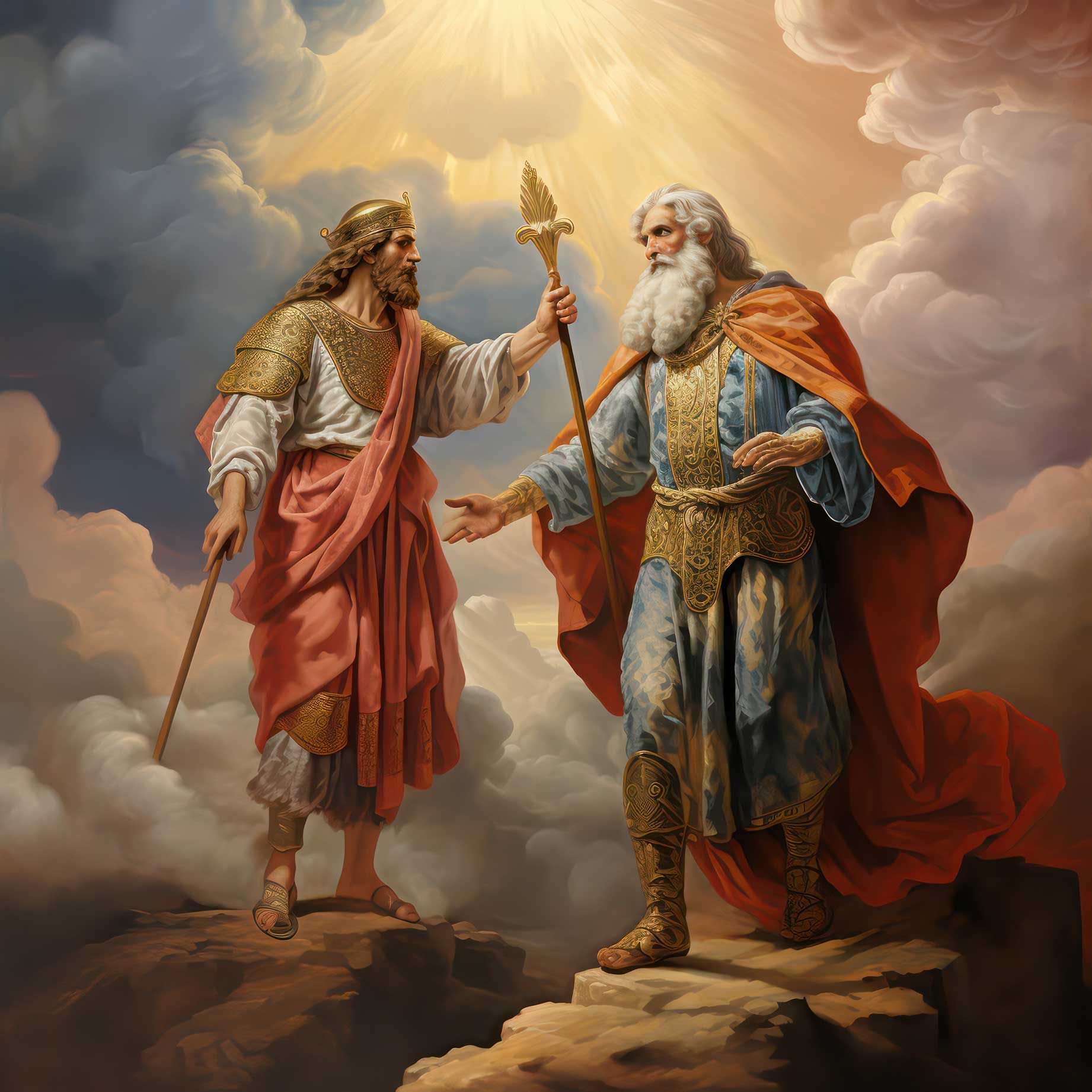Ecclesiastes 9:1
For all this I laid to my heart, even to explore all this: that the righteous, and the wise, and their works, are in the hand of God; whether it is love or hatred, man doesn’t know it; all is before them.
Ecclesiastes 9:2
All things come alike to all. There is one event to the righteous and to the wicked; to the good, to the clean, to the unclean, to him who sacrifices, and to him who doesn’t sacrifice. As is the good, so is the sinner; he who takes an oath, as he who fears an oath.
Ecclesiastes 9:3
This is an evil in all that is done under the sun, that there is one event to all. Yes also, the heart of the sons of men is full of evil, and madness is in their heart while they live, and after that they go to the dead.
Ecclesiastes 9:4
For to him who is joined with all the living there is hope; for a living dog is better than a dead lion.
Ecclesiastes 9:5
For the living know that they will die, but the dead don’t know anything, neither do they have any more a reward; for their memory is forgotten.
Ecclesiastes 9:6
Also their love, their hatred, and their envy has perished long ago; neither do they any longer have a portion forever in anything that is done under the sun.
Ecclesiastes 9:7
Go your way—eat your bread with joy, and drink your wine with a merry heart; for God has already accepted your works.
Ecclesiastes 9:8
Let your garments be always white, and don’t let your head lack oil.
Ecclesiastes 9:9
Live joyfully with the wife whom you love all the days of your life of vanity, which he has given you under the sun, all your days of vanity, for that is your portion in life, and in your labor in which you labor under the sun.
Ecclesiastes 9:10
Whatever your hand finds to do, do it with your might; for there is no work, nor plan, nor knowledge, nor wisdom, in Sheol, where you are going.
Ecclesiastes 9:11
I returned and saw under the sun that the race is not to the swift, nor the battle to the strong, neither yet bread to the wise, nor yet riches to men of understanding, nor yet favor to men of skill; but time and chance happen to them all.
Ecclesiastes 9:12
For man also doesn’t know his time. As the fish that are taken in an evil net, and as the birds that are caught in the snare, even so are the sons of men snared in an evil time, when it falls suddenly on them.
Ecclesiastes 9:13
I have also seen wisdom under the sun in this way, and it seemed great to me.
Ecclesiastes 9:14
There was a little city, and few men within it; and a great king came against it, besieged it, and built great bulwarks against it.
Ecclesiastes 9:15
Now a poor wise man was found in it, and he by his wisdom delivered the city; yet no man remembered that same poor man.
Ecclesiastes 9:16
Then I said, “Wisdom is better than strength.” Nevertheless the poor man’s wisdom is despised, and his words are not heard.
Ecclesiastes 9:17
The words of the wise heard in quiet are better than the cry of him who rules among fools.
Ecclesiastes 9:18
Wisdom is better than weapons of war; but one sinner destroys much good.
Ecclesiastes 9:1
For all this I considered in my heart even to declare all this, that the righteous, and the wise, and their works, are in the hand of God: no man knoweth either love or hatred by all that is before them.
Ecclesiastes 9:2
All things come alike to all: there is one event to the righteous, and to the wicked; to the good and to the clean, and to the unclean; to him that sacrificeth, and to him that sacrificeth not: as is the good, so is the sinner; and he that sweareth, as he that feareth an oath.
Ecclesiastes 9:3
This is an evil among all things that are done under the sun, that there is one event unto all: yea, also the heart of the sons of men is full of evil, and madness is in their heart while they live, and after that they go to the dead.
Ecclesiastes 9:4
¶ For to him that is joined to all the living there is hope: for a living dog is better than a dead lion.
Ecclesiastes 9:5
For the living know that they shall die: but the dead know not any thing, neither have they any more a reward; for the memory of them is forgotten.
Ecclesiastes 9:6
Also their love, and their hatred, and their envy, is now perished; neither have they any more a portion for ever in any thing that is done under the sun.
Ecclesiastes 9:7
¶ Go thy way, eat thy bread with joy, and drink thy wine with a merry heart; for God now accepteth thy works.
Ecclesiastes 9:8
Let thy garments be always white; and let thy head lack no ointment.
Ecclesiastes 9:9
Live joyfully with the wife whom thou lovest all the days of the life of thy vanity, which he hath given thee under the sun, all the days of thy vanity: for that is thy portion in this life, and in thy labour which thou takest under the sun.
Ecclesiastes 9:10
Whatsoever thy hand findeth to do, do it with thy might; for there is no work, nor device, nor knowledge, nor wisdom, in the grave, whither thou goest.
Ecclesiastes 9:11
¶ I returned, and saw under the sun, that the race is not to the swift, nor the battle to the strong, neither yet bread to the wise, nor yet riches to men of understanding, nor yet favour to men of skill; but time and chance happeneth to them all.
Ecclesiastes 9:12
For man also knoweth not his time: as the fishes that are taken in an evil net, and as the birds that are caught in the snare; so are the sons of men snared in an evil time, when it falleth suddenly upon them.
Ecclesiastes 9:13
¶ This wisdom have I seen also under the sun, and it seemed great unto me:
Ecclesiastes 9:14
There was a little city, and few men within it; and there came a great king against it, and besieged it, and built great bulwarks against it:
Ecclesiastes 9:15
Now there was found in it a poor wise man, and he by his wisdom delivered the city; yet no man remembered that same poor man.
Ecclesiastes 9:16
Then said I, Wisdom is better than strength: nevertheless the poor man’s wisdom is despised, and his words are not heard.
Ecclesiastes 9:17
The words of wise men are heard in quiet more than the cry of him that ruleth among fools.
Ecclesiastes 9:18
Wisdom is better than weapons of war: but one sinner destroyeth much good.
Summary of Ecclesiastes Chapter 9
In Ecclesiastes 9, the text delves into the unpredictability of life and the universality of death. It underscores that life's events—whether of love or hatred, good or bad—are indiscriminately experienced by all. The chapter engages with the existential notion that the same fate awaits both the righteous and the wicked, rendering life's efforts seemingly futile. Despite this, it maintains that while life persists, there is hope, as expressed in the adage, “a living dog is better than a dead lion." Wisdom is extolled, yet the text cynically notes that wise deeds and their doers are often forgotten. The chapter ultimately advises enjoying life and one's labor, for death nullifies the capacity for action or change.
Summary of Libertarianism
Libertarianism champions the principles of individual liberty, autonomy, and minimal state intervention in personal and economic spheres. The philosophy prioritizes the protection of individual rights and private property, exhibiting deep skepticism towards authority. It advocates for voluntary associations and free-market principles as the bedrock of social organization. Libertarians typically oppose militarism, nationalism, and state overreach. The movement encompasses various perspectives, from left-leaning proponents of social justice and resource egalitarianism to right-leaning advocates of laissez-faire capitalism and limited government.
Similarities
Focus on Individual Experience: Both Ecclesiastes 9 and Libertarianism emphasize individual experiences. Ecclesiastes contemplates the personal journey and the inevitability of death, while Libertarianism centers on individual liberty and autonomy.
Skepticism of Authority: Ecclesiastes expresses doubt about life's inherent justice and meaning, resonating with existential uncertainty. Similarly, Libertarianism is critical of centralized authority and advocates for minimal intervention.
Human Action: Ecclesiastes 9 encourages individuals to relish life's pleasures—food, drink, and companionship—aligning with Libertarianism’s promotion of personal choice and autonomy.
Differences
Religious vs. Secular: Ecclesiastes 9 is fundamentally religious, acknowledging divine influence over human fate. Libertarianism, in contrast, is a secular philosophy, stressing human agency independent of divine intervention.
Concept of Fate: Ecclesiastes frames life as bound by fate and inevitability, with outcomes beyond personal control. Libertarianism emphasizes that individuals are central to shaping their own destinies through action and choice.
View on Equality: Ecclesiastes highlights the universal inevitability of death, suggesting an existential equality. Libertarianism focuses on legal equality but often tolerates social hierarchies, particularly within right-libertarian thought which upholds private property and capitalism.
Conclusion
Ecclesiastes 9 and Libertarianism, despite their distinct origins and focal points, both offer rich reflections on individual roles within broader contexts. Ecclesiastes provides a religious, contemplative perspective on life's fleeting nature and intrinsic joy, framed by divine mystery. Libertarianism proposes a framework centered around maximizing individual freedom and responsibility within secular political and economic constructs. Despite their differences, both philosophies invite introspection about agency, action, and the unpredictable nature of existence.
Read more: Libertarianism (Wikipedia)
Summary of Ecclesiastes Chapter 9
Ecclesiastes Chapter 9 ventures into deep musings on life, mortality, and human efforts. It begins with the poignant assertion that both the virtuous and the wicked face a common fate—death. This inevitable "one event to all" presents death as the ultimate equalizer, seemingly dismantling any moral framework in life. Despite its seemingly nihilistic tone, the text urges readers to live joyfully and purposefully: indulge in food and drink, cherish one's spouse, and work diligently, knowing there is no knowledge, wisdom, or action in Sheol (the grave). From the perspective of wisdom literature, it respects wisdom while acknowledging its limits, demonstrated through the parable of a poor wise man whose counsel saved a city but went unheeded.
Summary of Relationalism
Relationalism is a philosophical viewpoint that underscores the importance of relationships in comprehending reality. Relationalism posits that entities exist and gain meaning through their interactions with other entities. This ideology pervades various fields:
- Space and Time: Contrary to Newton's substantivalism—which holds that space and time exist independently—relationalism perceives them as emergent properties from relations among objects.
- Colour Theory: Colours are understood relationally, derived from the interaction between objects and observers.
- Sociological Theory: Individual identity and actions are interpreted through social interactions and networks rather than as intrinsic attributes.
Similarities
1. Interconnectedness
- Ecclesiastes 9: Highlights the interconnected nature of human experiences, where everyone shares the same fate regardless of moral standing.
- Relationalism: Stresses that entities (objects, people, or concepts) exist only through their relationships with other entities.
2. Perspective on Control Over Life
- Ecclesiastes 9: Suggests that human actions (virtuous or wicked) are ultimately under God's control and subjected to fate.
- Relationalism: Asserts that object properties or social roles are defined not in isolation but in relation to other entities or contexts.
3. Recognition of Limits
- Ecclesiastes 9: Acknowledges that while wisdom is valuable, it is not absolute in providing security or recognition.
- Relationalism: Accepts that properties and meanings are context-dependent, thus not universally fixed or absolute.
Differences
1. Basis of Reality
- Ecclesiastes 9: Frames existence and events within a theological context, attributing them to "the hand of God."
- Relationalism: Adopts a secular approach, portraying the nature of reality and existence as interactions and relationships without invoking a divine entity.
2. Attitude Towards Life
- Ecclesiastes 9: Advocates for joy and diligence amid life's vanity and the inevitability of death, presenting this as divinely sanctioned respite.
- Relationalism: Does not prescribe a specific way of living but focuses on interpreting existence through relational concepts.
3. Ultimate Fate
- Ecclesiastes 9: Views death as the final cessation, where no action, plan, or wisdom can be pursued.
- Relationalism: Insists on the persistence of relationships and interactions as constitutive of reality, without proposing an ultimate terminus like Sheol.
Conclusion
Ecclesiastes 9 and Relationalism converge on the notion of interconnectedness and the limitations of individual efforts. Nevertheless, they diverge significantly in their foundational contexts: Ecclesiastes 9 is rooted in theology, emphasizing divine control and life's inherent vanity, whereas Relationalism is a philosophical approach that describes existence in terms of relationality without invoking deity. This juxtaposition underscores how diverse philosophical and theological perspectives can offer overlapping yet distinct interpretations of human experience and reality.
Read more: Relationalism (Wikipedia)








Read the Chapter Summary by clicking the icon above.